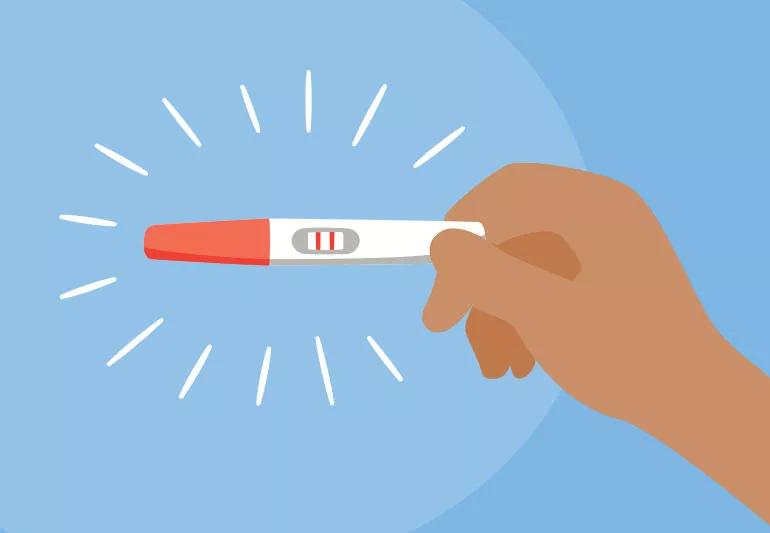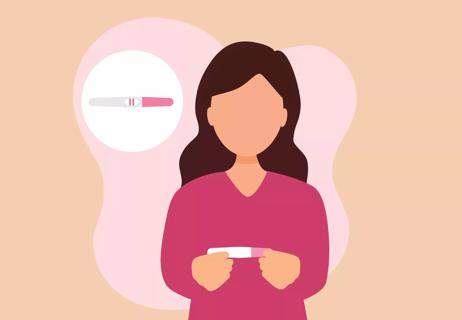While 80% of women will get pregnant within six months, age and other factors make a difference

When you’re trying to get pregnant, the anticipation is real. Whether you’ve been trying for a while or just starting to think about stopping birth control, the days on the calendar suddenly take on new meaning. Is it an ovulation day? Is my period due? Is it time to talk with a fertility specialist?
Advertisement
Cleveland Clinic is a non-profit academic medical center. Advertising on our site helps support our mission. We do not endorse non-Cleveland Clinic products or services. Policy
And, of course, how long does it really take to get pregnant?
The answer isn’t so cut and dry. A lot comes into play when considering how long it will take to conceive, and the timeline will be different for everybody.
After all, as Ob/Gyn Chris Cantwell, MD, notes, “People write entire textbooks on this stuff.”
We talked with Dr. Cantwell to unpack it a bit (but leave the textbooks to the med students).
A quick refresher on the “birds and the bees” for starters. To get pregnant without medical interventions, you need to have vaginal intercourse, which means penis-vagina-style sex. That’s the only kind of intercourse that allows semen (sperm) to get to an egg and fertilize it, thereby conceiving a fetus.
For fertilization to occur, semen need to be deposited inside of your vagina, where it’ll start making the trip up your cervix and toward your fallopian tube in search of an egg to fertilize. Once fertilized, the developing embryo travels to the uterus and sets up shop. Soon, your body will start releasing human chorionic gonadotropin (hCG), also called the pregnancy hormone. Around then, you’ll be able to see a positive home pregnancy test.
The timeline from unprotected sex to that positive test is (roughly):
Advertisement
Dr. Cantwell says it’s a well-accepted fact among pregnancy healthcare providers that 80% of women who are having vaginal intercourse regularly and aren’t using birth control will successfully get pregnant within six months. By 12 months, an additional 5% will become pregnant.
Your fertility naturally declines with age, though. In any given menstrual cycle, the American College of Obstetrics and Gynecology says your chances of becoming pregnant are:
Those figures are based on the age of women. The age of a man doesn’t have a drastic effect on fertility.
“We use age 35 as a dividing line,” Dr. Cantwell states. “We know that after that, you’re more likely to have difficulty getting pregnant. There are also higher rates of complications during pregnancy. Of course, it’s completely possible to get pregnant and have healthy pregnancies after 35, but the research shows that things can get more difficult in your late 30s and beyond.”
How often people have sex is a personal matter. Probably one of the most personal matters out there to be honest.
The thing about getting pregnant isn’t that you have to have sex all the time. What’s more important, Dr. Cantwell says, is the timing of that sex (which may sound decidedly less-than-sexy).
“Ovulation, when the ovary releases an egg, happens in the midpoint of your menstrual cycle, and that’s when you’re most fertile,” he continues. “When the egg releases, that’s when sperm can fertilize it and develop into a pregnancy.”
So, less important than the proverbial roll in the hay every day is having sex that coincides with ovulation, as those are the days you’ll be fertile.
If your period comes at least somewhat regularly, about once every 28 to 35 days, you can estimate that you’ll ovulate about 14 days after the start of your last period. Having vaginal intercourse leading up to ovulation or during ovulation will up your chances.
“Sperm can live in the vagina for about five days,” Dr. Cantwell explains. “So, having sex just before you ovulate or during ovulation means sperm can be in position to get to the egg when it releases. The more you have sex during that ovulation window, the more sperm will be available, which increases the chances of fertilization.”
But not everyone’s bodies run like clockwork, so your ovulation calendar may look different. That’s OK. If your period is less-than-timely (or you just want to be more aware of your fertility window), you might consider trying an ovulation predictor kit. Ovulation kits are indication strips you can use at home. They work like a home pregnancy test — they’re little sticks that you pee on. But instead of determining if you’re pregnant, they’ll let you know if you’re about to ovulate in the next day or two.
Advertisement
“Ovulation strips look for the luteinizing hormone (LH),” Dr. Cantwell explains. “Ovulation is triggered by a sudden spike in LH. A positive ovulation test tells you that you are likely to ovulate in the next 24 to 36 hours, so that’s when we recommend starting to have intercourse.”
In order to get pregnant, you’ll, of course, need to stop using any form of birth control. That includes condoms, pills, IUDs or and any other methods you used in the past.
Dr. Cantwell points out that there are times when providers prescribe birth control pills for, say, irregular periods or acne. But they’re still birth control pills. Even if you’re taking them for another reason, they’ll prevent you from getting pregnant. So, if you’re planning on getting pregnant, make sure you understand the medication you’re taking and its effects on your fertility.
Similarly, IUDs (intrauterine devices) and implantable birth control devices can prevent pregnancy for years. They’re set-it-and-forget-it methods, and that can mean they’re easily forgotten about. After all, they’re designed to be something you don’t have to think about it. But if you’re looking to get pregnant, you’ll want to remember to get your birth control implant removed by a healthcare professional.
Advertisement
Even after they’ve stopped taking birth control, some women worry that their past use can impact their future fertility. In most cases, Dr. Cantwell says that after you stop birth control, your fertility will return quickly.
“You can get pregnant almost the next day after having an IUD removed,” he adds. “After stopping birth control pills, your hormones will start cycling naturally again within a few weeks and your ovulation will return to normal.”
One exception to this can be the Depo-Provera® birth control shot. It can take nine months to a year for fertility to return after you stop getting the shot. If you haven’t gotten pregnant after about six months of trying and you had been previously taking the birth control shot, Dr. Cantwell says your healthcare provider may be able to recommend some strategies for improving your chances of getting pregnant.
Dr. Cantwell says it’s a good idea to talk with your healthcare provider if you’re considering getting pregnant. In fact, preconception counseling is recommended by the ACOG for anyone who’s thinking about becoming pregnant. At a preconception appointment, your provider may:
Advertisement
Dr. Cantwell shares some steps you can take that may help increase your chances of getting pregnant:
He adds that it can also help if your partner “saves up” their sperm for when you’re ovulating.
“If they’re ejaculating frequently, there may be lower sperm counts available when you have sex around your ovulation time. It’s not always necessary, but it could help ensure there’s an adequate amount of sperm available when you’re most fertile.”
If you’ve been trying for a while and aren’t seeing results, a visit to your healthcare provider may be in order. They can advise you on whether it’s time to seek additional fertility support.
If you’re over the age of 35, Dr. Cantwell suggests talking with your healthcare provider about meeting with a fertility specialist if you haven’t become pregnant within six months of trying. Most people 35 and younger are encouraged to try for a year before seeking a fertility specialist.
“For people in their mid-30s and beyond, we know that fertility can drop off more quickly, so we don’t want you to have to go a full year of trying before we look into potential medical causes and treatments,” he says.
“That’s a pretty general recommendation, though, so if you have risk factors that increase your risk of infertility or if you just think you may need support, your provider should be willing to see you and talk about your situation.”

Sign up for our Health Essentials emails for expert guidance on nutrition, fitness, sleep, skin care and more.
Learn more about our editorial process.
Advertisement

While it’s probably not your most fertile time, it is possible to get pregnant if you have unprotected sex during your period

How a BMI in the overweight or obesity range affects ovulation and how to increase fertility

A fertility specialist talks timeline, diet and other prep steps

Can pregnancy tests be wrong?

The short answer from an Ob/Gyn

The short answer from an Ob/Gyn

An Ob/Gyn explains the question of timing

It’s important to angle it toward your rectum or back, along the natural curve of your vaginal canal

Even small moments of time outdoors can help reduce stress, boost mood and restore a sense of calm

A correct prescription helps your eyes see clearly — but as natural changes occur, you may need stronger or different eyeglasses

Both are medical emergencies, but they are very distinct events with different causes